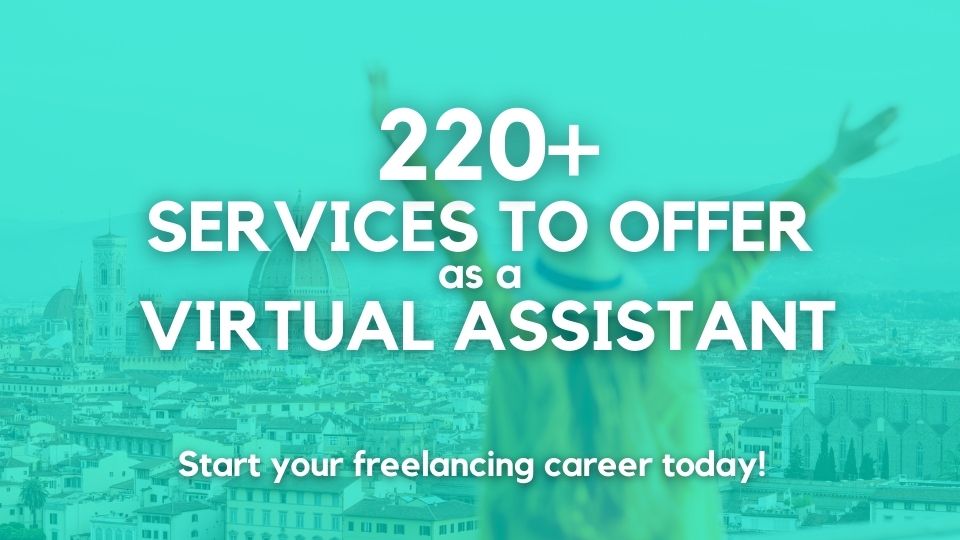What Is Freelancing? (And How To Get Freelance Work)
With the year 2020, the world has completely changed – especially the job market.
Remote work is now the norm.
Working remotely – including freelancing – will continue to be the norm, even after this craziness ends.
So you might be wondering: What is freelancing? What is freelance work? What is meant by a ‘freelance job'? Read on, dear reader.
Here you will learn all about freelancing, how freelancing works, and even how you can get started – if that's something you're interested in.
What Is Freelancing and how does it work?

The official freelance meaning from Dictionary.com is “working at different companies at different times rather than being permanently employed by one company.”
Basically, what this freelancing definition means is that a freelancer can work for as many or as little clients as they choose for as long as they want.
Freelancing, also referred to as contracting, is a type of self-employment. A freelancer (or independent contractor) may work for a company that also has employees, but the freelancer is self employed, and the company is their client.
A freelancer may work for large corporations, small businesses, or entrepreneurs with a very small team.
Additionally, a freelancer sets their own hours, chooses their own rate of pay (this may vary by job or client), and can work from wherever they want to.
A freelancer may take care of multiple clients at a time or have one or two large clients that make up the majority of their workload.

What Is Freelance Work?

Freelance work is any kind or type of job that can be performed by a freelancer (or independent contractor).
So what is meant by freelance job? A freelance job is offered by a company, business, or person to be completed by a self-employed freelancer.
Freelance work is often 1099 work – meaning the freelancer is in charge of their own tax withholdings. Also, freelancee work may consist of a one-time job or ongoing monthly work depending on the client and the tasks.
Your freelancing jobs may last as short as one day, or can be long term ongoing monthly projects. This depends on the niche and the type of work, and also the client themselves.
If you have been on any major job board lately, you may have seen freelance job opportunities. Freelancing is very common and becoming more and more popular. We are seeing this with the rise of work-from-home job opportunities and more companies switching to remote.
Freelance work can save employers time and money. And, freelance work is desired by many people because of the flexibility and freedom of the lifestyle. Freelancing is everywhere!
There are multiple different types of freelance work. A freelancer can perform very general administrative tasks like answering and organizing emails, file management, and data entry, or a freelancer can do very skilled work like web design.

Download this FREE ebook learn 60+ ways to earn an income from anywhere!
What Skills Are Required For Freelancing?
This depends on who you're talking to! In general, the skills required for freelancing are:
- Ability to use a computer
- Good verbal and written communication skills
- Being a self-starter – having the ability to motivate yourself to work without a boss looming over you
- Good time management skills
- Organizational skills – You don't have to be Marie Kondo… but keeping track of your emails and files is important here!
And… that's it! That's enough to get you started. If you can use a computer, are a hearing person, and you can type, you can get started freelancing as a transcriptionist.
Or, if you can use a computer, like writing, and can type, you can be a freelance writer.
Also – if you can use a computer, and have excellent organizational skills, you can be a freelance virtual assistant. Freelance VA's do admin tasks like email management and data entry.
The more skilled you are, the more possibilities open up for you in the world of freelancing. However, you don't have to be a highly-skilled or even college educated person to get started as a freelancer! Freelancing requires no degrees or certifications to get started – unless you're choosing a niche that requires it.
Some very in-demand skills and jobs for freelancing are:
- Marketing
- Facebook Ads
- Social Media Management
- Blog writing
- Editing
- Proofreading
- Graphic Design
- Virtual Assisting
- Administrative Tasks
And many, many more. These skills listed here are very in-demand and don't take long to learn.
[elementor-template id=”2450″]
How Can I Start Freelancing?

I get this question all the time and I love helping people out with this! Here's how you start freelancing in 9 steps:
1. Define your freelancing goals.
Do you want to become a freelancer to earn some money on the side, or do you want to eventually be a full-time freelancer? Decide on what level of income you need to bring in as a freelancer.
2. Narrow down your skills.
You have a ton of knowledge and several skills that you can use to become a self employed person. Many freelancers, myself included, start with the most basic skills to find work and build on them from there.
Write down all skills you've ever used for any job, hobby, or just for fun, and figure out how that skill can translate into working as a freelancer!
3. Choose the type of company you want to work for or with.
Do you want to work for large companies, small businesses, or independent entrepreneurs?
4. Research.
Do research on what kind of services you can offer with your skills. Once you have this figured out, start looking for competitors that are doing exactly what you want to! See what kind of services they're offering and how they're pricing them. Model your own services and pricing after your competitors.
Do not copy competitors, simply model after them. When you become a freelancer, you want to stick with what's already working – like the packages and pricing that works for your competitors.
5. Create 1 – 3 services or packages and price them.
6. Start looking for work!
You can find freelance clients and freelance work in many ways. The first place to find work is by using your existing network. This is where your Facebook friends come in handy!
Make a post that you have decided to become a self employed person and start working either full time or part time as a freelancer. List the services you are offering, and ask your Facebook friends if they or anyone they know of could use your work.
Not only is your existing network handy, Facebook groups are going to be your new best friend. There is a group for just about everything you can think of on Facebook! Including groups full of hundreds of thousands of small businesses and entrepreneurs that need to hire freelancers just like you.
7. Get testimonials.
In the beginning it will be a little difficult to get work. This is because you are new and haven't established yourself yet.
When you've been working as a freelancer for a long time, work tends to just land in your lap. But in the beginning, you have to get the word out.
Use your network on Facebook and other social media platforms to look for work in exchange for testimonials.
What I mean by this is: you may end up doing some free work just in exchange for a testimonial, and this is totally okay.
Don't work an entire month for free, but small jobs here and there for testimonials can do wonders for you. And some of that free work may even turn into a paid freelance working position.
8. Build a portfolio.
This step kind of goes side-by-side with getting testimonials. Building a portfolio is simply creating a place online where examples of your work can “live” to show to potential clients.
This can be on a website or on a cloud sharing platform like Dropbox or Google Drive.
I 100% recommend a website, but in the beginning it can be overwhelming so it's optional.
If you haven't gotten any clients yet, create sample work.
If you want to be a freelance writer, write sample articles. Start a blog. Publish on Medium and LinkedIn.
If you want to be a Pinterest manager, start a blog and create your own Pinterest account. Use your own results and your own sample work as proof to potential clients that you can get results.
9. Browse job boards.
You can find freelance jobs on many of the major job boards, and you can also find freelance jobs on gig websites like Upwork or platforms like FlexJobs.
These platforms can be competitive, but if you stick with it, you'll start landing clients!
Pros and Cons of Freelance Work and Being a Freelancer

As with anything, there are both pros and cons of being a freelancer. In my opinion, the pros far outweigh the cons, and I'm sure many freelancers agree!
Pros of Being a Freelancer
- Freelancers are self employed. When you're self employed, you get to make all the rules! You are your own boss, and that's pretty sweet.
- Freelancers set their own hours. When you become a freelancer, you get to decide when you want to work and for how long. No longer are you stuck to a rigid schedule – you can work whenever you want! If you have a busy traveling lifestyle, you can fit work into your downtime. Or, if you're most productive at 3am, go for it!
- Freelancers set their own pay rate. When you become a freelancer you are no longer stuck with a set pay rate and only a certain amount of raises per year. You can charge however much you want – and you can work however much you want. And if you start and scale a freelancing business, the income potential can be unlimited.
- Working from wherever you want. Freelancers are frequent travelers – because freelancers can work from wherever they want to! This reason right here is the number one reason I decided to become a freelancer. No longer does traveling have to be reserved for vacations – you can work as you travel, so it never has to end if you don't want it to.
Cons of Freelancing
- Freelancers are independent contractors, which means they're in charge of all their taxes and tax withholdings. Also, freelancers are responsible for seeking out and acquiring any desired benefits like health insurance, 401k, and more.
- Freelancers are self-employed. This is a pro AND a con! When you work from home, you need to make sure you can stay on top of yourself. Procrastination is an easy trap to fall into – being a self-starter is a must!
- As a freelancer, you can work from anywhere – and this can be a problem. When you work from home or are working as a freelancer, it can be temping to just work all the time!
The job of freelancer is never “done”. This can create an unhealthy work/life balance which leads to burnout. Burnout is like a depression coupled with brain fog and it's just not fun or pretty or anything I would ever wish on anyone – speaking from experience here.
The key to avoiding this is to only work during whatever “work time” you have defined for yourself, and leave it at that! Self care and time off is important, yo.
- Gigs can come and go frequently. Unless you are working strictly long term freelance jobs, it can feel like feast or famine in the beginning.
Freelancing is Flexible
Freelancing is so, so flexible. It's a great choice for those who want to travel, want to up their income earning potential and learn new skills, want to spend more time with their families, or simply just want a more flexible lifestyle. A traditional job offers workers a career and a steady paycheck, but can be restrictive and limited. Freelancers enjoy higher pay, less working hours, and a flexible lifestyle.
As a freelancer you can charge higher rates per project than what you would earn hourly as an employee, so you can work less while still earning the same amount of money, or more. Freelancers are in demand in almost every professional industry you can think of, and that's not going to change any time soon.
Many individuals start out as part time freelancers to dip their toes in and make sure it's right for them. This is also a great way to start because you can keep your full-time job while you build up your side income. It's up to you to decide if these pros and cons are worth it, and part-time freelancing will help you do just that.
How To Start A Freelancing Business
Do you think starting a freelancing side hustle or freelancing business is for you? You're in the right place. Getting through this article is a great first step. I know you can be a successful freelancer. Trust me, if I can do it, anyone can. I started from absolute zero with no skills and now I have so much work that I frequently have to turn clients down!
Starting a freelancing business is as simple as becoming a freelancer. As an independent contractor, you are self employed. Independent contractors are business owners – of themselves.
Once you become an established freelancer you will take care of multiple clients and work close to full-time. Freelancers themselves even hire other freelancers to help them with their workloads – like hiring a virtual assistant to help you with organization, customer service, or more!
What is Freelancing? Now You Know!
You've made it to the end of this article and I applaud you, aspiring freelancer. Soon you will join the ranks of freelancers everywhere, living a flexible lifestyle, working only with people that you like, and hopefully earning more than you do now. You will never again ask “what is freelance work?” because you found this handy article – and it even inspired you to start freelancing yourself.
Do you have more questions about freelancing or the freelancing lifestyle? Let me know in the comments below!

Carrie Wilder
Carrie has a passion for location independence and nomadic lifestyles. After traveling full-time in an RV and living the van life, she created Making Money and Traveling to help others make the switch to a remote lifestyle. Learn more about Carrie on the About page or connect on social media below.
Download this FREE ebook learn 60+ ways to earn an income from anywhere!


